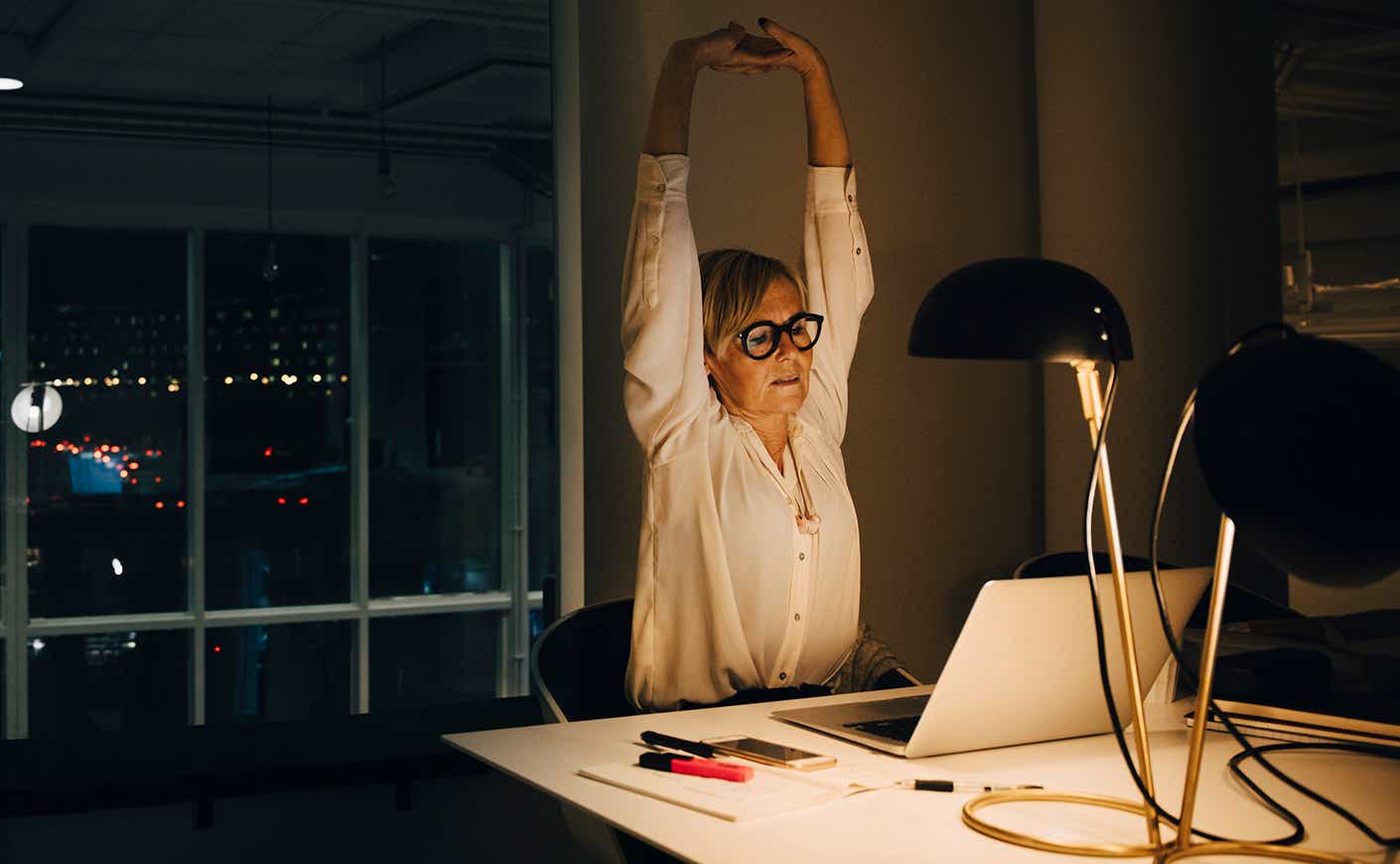Did you know the average American spends nine hours a day in front of a screen? We’ve heard about the impact of blue light on our sleep cycle, but what does this long-term screen exposure do to our skin? “Blue light exposure can lead to irregular hyperpigmentation, or dark splotchy skin, regardless of skin type,” dermatologist Dr. Beth Goldstein told us.
Goldstein, an Adjunct Clinical Associate Professor in the Department of Dermatology at University of North Carolina at Chapel Hill, says there’s still more research to be done on the effects of blue light. In the meantime, she recommends using a mineral based sunscreen and these blue-blocking glasses by Felix Gray when sitting at a computer all day.
Katie Couric Media: First things first, what exactly is blue light?
Dr. Beth Goldstein: Blue light is visible light with wavelengths between 400 to 500 nm. The main source of blue light is sunlight, followed by light emitted from our electronic devices such as digital screens from the TV, smart phones, dimming lights as well as typical fluorescent lights.
You won’t feel blue light on your skin like a sunburn, but you’ll definitely see the impacts over time.
Does long-term exposure to blue light damage your skin?
The long-term effects of blue light on the body, such as our eyes and brain are still unclear.
However, we do know that blue light definitely impacts our skin. With extensive exposure to blue light, such as sitting in front of a screen, by a window or outside for extended periods of time, it can cause skin aging, redness and irregular brown pigment on the face. This is especially true for people who have darker complexions.
What exactly does it do to your skin? Can it cause skin cancer?
The good news is that as far as any research shows, blue light does not cause any DNA damage, so all the hours spent on Instagram or working from home are not going to increase your risk of skin cancer.
However, exposure to blue light can lead to irregular hyperpigmentation, or dark splotchy skin, regardless of skin type. In darker skin types, blue light shoots off a complex chemical reaction that results in the production of excess melanin, your skin’s pigment.
Even worse, your skin experiences oxidative stress attributed to blue light, which can wreak havoc on your collagen, the protein that makes your skin stretchy and reduces wrinkles. By attacking the collagen through oxidative stress, blue light contributes to skin aging similar to damaging UVA rays from the sun.
So, should we wear sunscreen while sitting at our computers all day?
As noted in the State of Skincare Report, there are many benefits to wearing sunscreen for all skin types beyond preventing sunburns. An average American spends nine hours per day in front of a screen. This extensive exposure definitely warrants our attention to understand how blue light impacts our lives. Even though the blue light emitted from screens is miniscule compared to that from the sun, there are plenty of other benefits from wearing sunscreen both indoors and outside. Products with mineral based broad spectrum SPF 30 or greater can be helpful in reducing the challenges caused by blue light exposure. Tinted sunscreens, due to the presence of iron oxide, can also be helpful.
Are there any additional products we should use to protect our skin from blue light?
There is more interest in blue light protection with many ingredients now making claims of providing protection. A recent study showed how ingredients such as niacinamide and Scenedesmus Rubescens extract have been shown to reduce pigmentary changes and redness after exposure to blue light.
Products such as The Daily by GETMr have both mineral sunscreen agents like zinc and niacinamide. The Unseen Sunscreen by Supergoop has similar characteristics along with the algae mentioned above.
What about blue light glasses? How effective are they?
There is still much uncertainty regarding the impact of blue light on our health. However, the most recent research states that blue light will not cause severe conditions like macular degeneration or blindness.
In the near term, we know that one very significant issue with blue light is its negative impact on our sleep cycle. Excessive blue light disrupts melatonin production, especially at bed time. By stifling melatonin levels, blue light disrupts your circadian rhythm otherwise known as your body’s internal clock.
Here are some of my recommendations:
- Avoid exposure to screens for 2-3 hours before bedtime — hard to follow, I know.
- Shift to using red lights at night
- If you work a night shift or use a lot of electronic devices at night, consider wearing blue-blocking glasses such as those by Felix Gray
- Seeking bright light during the day can improve your ability to sleep at night, as well as your mood and alertness during daylight. Be sure to protect your skin and eyes with proper protection if exposing yourself to bright light during the day.
Dr. Beth G. Goldstein is an Adjunct Clinical Associate Professor in the Department of Dermatology at University of North Carolina at Chapel Hill. She performs Mohs (skin cancer surgery) in her private practice located across the Research Triangle in North Carolina. She is an editor on several topics in UpToDate, a leading evidence-based clinical decision support resource used by clinicians worldwide, is a Fellow of the American Academy of Dermatology and the American Society for Mohs Surgery and most recently launched a skin protection product to help more men wear sunscreen on a daily basis.
Written and reported by Eliza Costas









